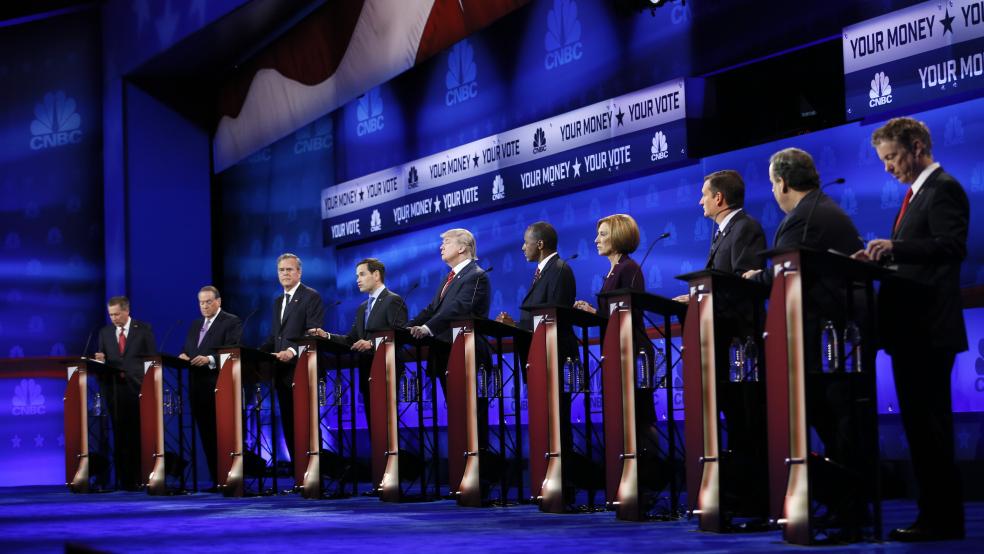When GOP presidential frontrunner Donald Trump first shocked the country with his call for temporarily barring Muslims from entering the U.S., former Florida governor Jeb Bush said the billionaire businessman had come “unhinged.” Most of Trump’s other campaign rivals denounced his idea as reckless and un-American.
“This is the kind of thing that people say when they have no experience and don’t know what they are talking about,” New Jersey Gov. Chris Christie said in a radio interview. “We don’t need to resort to that type of activity, nor should we.”
Related: The 2016 GOP Presidential Contest Just Became a Brand New Race
But Bush, Christie and 6 other Republican candidates will have to thread the needle in attacking Trump Tuesday night during the fifth nationally televised GOP debate in Las Vegas. That’s because -- amid mounting national anxiety over the recent bloody terrorist attacks in Paris and San Bernardino, California -- many Americans are calling for much tougher action against ISIS and homegrown Islamic terrorists than President Obama is willing to provide.
Moreover, a sizeable majority of Republican voters heartily agree with Trump that non-citizen Muslims should be kept out of the country on national security grounds – even if this religious test for granting entry raises serious constitutional questions and has drawn sharp fire from civil libertarians, political leaders from both parties and Muslim advocates around the globe.
Ross Baker, a Rutgers University political scientist, said today that Bush, Christie, Ohio Gov. John Kasich and others had no choice but to lash out at Trump’s Dec. 7 call for barring Muslims because the draconian proposal was badly hurting the GOP image and might prevent Trump or any other GOP presidential nominee from winning the 2016 presidential election.
“But at the same time, I think that in the debate, where this is certain to come up, I think they have to handle him with kid gloves, because they do have to get through the primary and that clearly is a voting issue for lots of Republicans in the base of the party.”
“This really puts [the GOP candidates] on the knife’s edge because they rarely have to deal with a situation in which the consequences for the primary and the general election are so clearly at odds,” Baker added.
Trump enters tonight’s two-hour debate sponsored by CNN as the undisputed frontrunner in the GOP presidential contest: According to a new Washington Post-ABC News poll released on Monday, Trump is the favorite of 38 percent of GOP registered voters or Republican-leaning independents, a new high for him in the poll, while Sen. Ted Cruz of Texas finished a distant second with 15 percent.
Related: Cruz to Trump: You’ll Lose, and I’ll Take Your Voters
That poll comes on the heels of a new Monmouth University poll national poll of Republicans and independents leaning toward the GOP showing Trump with the support of 41 percent, nearly tripling the support of his closest rival. Yet Trump is beginning to feel the effect of a surging Cruz, who leads Trump in Iowa according to the Des Moines Register/Bloomberg Politics Iowa survey. And Christie has begun to pick up a little momentum in New Hampshire after months of languishing in the polls.
For now, Trump is peerless in his appeal to some Republicans based on his anti-Muslim comments and proposals in the wake of the latest jihadist Islamic-inspired or directed terrorist attacks. And there doesn’t appear to be political downside to any of Trump’s calls for barring Muslims, deporting millions of illegal immigrants, building a security wall along the U.S.-Mexico border or developing new databases and watch lists to track potentially dangerous people in this country.
Sixty percent of all Americans believe that Trump’s call for barring Muslims who are not U.S. citizens from entering this country is wrongheaded and inappropriate while 36 percent support the controversial approach. Yet among the GOP base—a narrow group who will determine the outcome of the primary contest next year--59 percent agree with Trump.
Related: Here’s Why the Republican Party Is Terrified of Trump
A new Wall Street Journal-NBC News poll confirms what other recent surveys have shown: that voter concern about terrorism and the war on ISIS has eclipsed long standing fretting about the economic recovery. Forty percent of those polled said that national security and terrorism should be the government’s top priority, while more than 60 percent consider national security to be among their top two concerns, up from 39 percent eight months ago.
Cruz, Bush, Christie, Sen. Marco Rubio of Florida and former neurosurgeon Ben Carson argue that they would be best equipped to address these concerns as the next commander-in-chief, but most voters for now don’t agree. Among the Republican voters interviewed by the Washington Post and ABC News, 54 percent say that Trump is the strongest leader, 50 percent say he could best handle the terrorism threat and immigration, and 47 percent say he has the best chance of winning in November. Cruz and the others scored in the low teens on these questions.
Ron Bonjean, a Washington policy and political consultant, said today that Trump’s GOP rivals must make a strong case for an alternative to his approach in tonight’s debate. “National security is the number one issue among Republicans at this point and Trump is trying to corner the market by putting a ban on all Muslims,” he said. “That seems to have resonated with the right wing of the party.”
“At the same time, it’s important for the other candidates to show how strong they would be on national security, while providing alternatives for tighter immigration control on refugees entering the United States that … stop short of barring Muslims but that would satisfy Republicans.”





